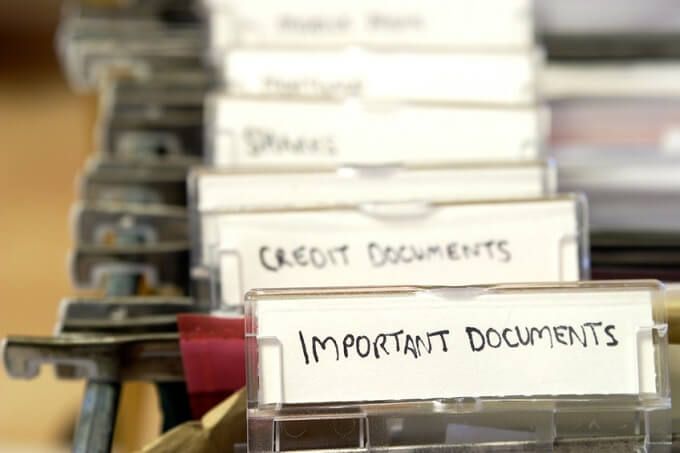-
Household Documentation
- Records and certificates of birth, marriage, divorce, adoption, child custody papers, etc.
- Passport, driver’s license, Social Security Number, Military ID, work visa, green card and other photo identification
- Pet ownership papers, vaccination records or rabies tag, identification tags (ID tags with your current contact information should always be on your pet’s collar)
-
Medical Information
- Health insurance card (including dental and vision, if applicable), Medicare, Medicaid, VA
- List of current medications (including dosages), immunizations, allergies (including a description of the reaction, as well as actions to be taken), medical equipment and devices, pharmacy contact information
- Legal medical orders: Living will and medical power of attorney
- Caregiver contact information, service agreement
- Disabilities documentation
- Contact information for doctors, dentists and veterinarians
-
Emergency and Household Services Contact Information
- Employers and immediate supervisor (according to your company’s policy)
- Schools (day cares, central administration or district office)
- Social service providers
- Home Owners Associations (HOA)
- Home and auto repair service providers
-
Valuable Personal Articles
- Mementos, family heirlooms, photos, collections and keepsakes
- Jewelry, art, coins, etc.
- Anything you may have insured
-
Financial and Legal Documentation
- Housing: lease or rental contract, mortgage documents or title to your home
- Vehicle: loan information, Vehicle Identification Number, registration, title (insurance was mentioned below)
- Financial: checking, savings, debit cards, retirement, life insurance
- Other Financial Obligations: utility bills, credit cards, student loans, alimony, child support, elder care, automatic payments such as gym memberships
- Insurance Policies: homeowners, renters, auto, life, flood, windstorm and hail, along with appraisal documents, photos and a list of valuable property
- Tax Statements: income tax returns, property tax, vehicle tax
- Estate Planning: wills, trusts and power of attorney documents
Protecting Documents and Valuables
Once you have collected these important pieces of information, the next step is to keep them safe. Imagine, if your personal property or income is impacted by a disaster, you will need to provide documentation to prove you have the right to request assistance from insurance providers and from government disaster assistance programs. Here is a checklist to help you safeguard your important documents:
- Paper Copy Storage: The best option for storing paper copies of important documents is in a fire- and waterproof safe, in a bank safe deposit box, or with a trusted friend or relative. When opting to use a safe deposit box, ask your bank or check State laws to confirm who can and cannot access the safe deposit box should the lessee be unable to do so.
- Electronic Copies: Store electronic copies of important documents in a password-protected format on a removable flash drive or an external hard drive and keep the storage device secure in your fireproof and waterproof box or safe. Another option is to use a secure cloud-based service like Dropbox, Apple iCloud or Google Drive, to name a few. Just be sure you encrypt your documents or files before uploading them.
- Location: Depending on where you live and where you store valuables, think about ways to better protect these items. For example, if you store possessions in a basement, you may want to move them to a higher location and put them in waterproof containers to lessen the potential for water damage caused by flooding. In locations that experience high winds or earthquakes, you may also want to secure items that are displayed on shelves or walls.
It is critical to understand that in case of a disaster, you must secure all the documents you will need for insurance claims or disaster relief. Without the proper documentation it can take much longer to get financial assistance and begin the recovery process. For additional checklists and guidance on collecting and safeguarding important information, download FEMA’s Emergency Financial First Aid Kit.
Source: FEMA’s Protect Your Critical Documents and Valuables
Additional Resource: The U.S. Department of Homeland Security offers useful guidance on how to prepare for natural disasters.
